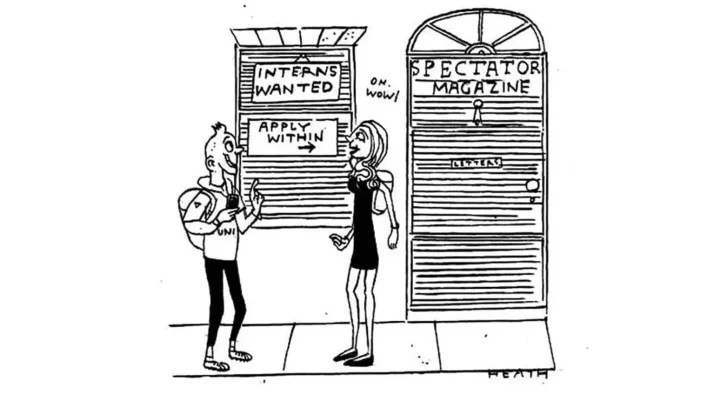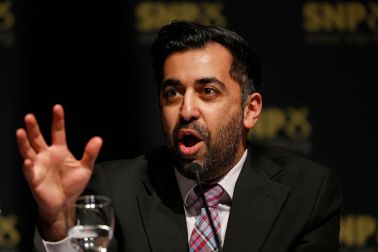The Spectator runs the UK’s only double-blind internship scheme. We don’t ask for a CV, we don’t use your name. We don’t care where (or whether) you went to university, we anonymise your application. We give each applicant a city name, mark out of 100 and give offers to the best ones. You’ll come in for a week of your choosing. It’s a useful window into journalism and gives us the chance to meet new talent. When jobs come up, as they do in various fields, we look to hire past interns.
About a third of our editorial staff came through this way: online (Gus, John and Max), broadcast (Cindy and Oscar), management (Lukas), data (Michael), Ukraine (Svitlana – we made a job for her), social (Margaret) and tech (Fabian, a former chef). Full list below. This year, we’re adding marketing and tech. No other publication goes to such lengths to find interns, which is perhaps why those who make it on our shortlist are often snapped up by other publications.
We anonymise after the best intern one year was Dan Hitchens. He is indeed son of, nephew of. But he is also a superb journalist, as is often the case with those with writing in the family – from Auberon Waugh to Dominic Lawson.
We don’t use CVs because we regard that means of recruitment as stale and unfair, reflecting not much more than whether you were good at exams aged 18. Many brilliant journalists did excel at school and university, but others – like Frank Johnson, a former Spectator editor – took different routes. Looking at The Spectator’s senior editors now, one left school aged 16 and another is an alumnus of Eton and Oxford. None of that stuff matters here. Only talent does.
We typically get 200 applications for about 12 places. So why apply against such odds? It’s fun, fair and genuinely open: Katherine Forster, a 48-year-old mum who had never had a full-time job, came through on our scheme and ended up at the Sunday Times and is now a television reporter. Fabian Carstairs was a chef before he joined our tech team. When Svitlana Morenets arrived, displaced by the war in Ukraine, she knew no one in Britain. She’s sitting next to me now as a staffer, and has been nominated for Young Journalist of the year at the UK Press Awards on Thursday. Their breaking into UK journalism would only have been possible through the Spectator scheme, perhaps the most meritocratic of any publication.
If you have applied before, then please do so again: James Heale, now our political correspondent, applied three times. Email entries to internship@spectator.co.uk, deadline 31 May.
Choose a category (or more than one if you like) and for each one do three or more of the following:
Magazine and online
- Suggest three cover stories for The Spectator with authors.
- Suggest three potential diarists or interview subjects. Explain your choice.
- Make this into a 1,000-word Spectator article. We’d assume you’d liaise with the author throughout the process and he’s approved any edits. (Extra points as this is super hard.)
- Find three articles from the foreign press (a fortnight before your application) that have not been picked up by the UK press and say how The Spectator could expand on it.
- Suggest three articles for Spectator Life.
- Write a ‘Notes on’ (500 words).
Broadcast
- Produce a short video (no more than five minutes) explaining a recent article you read in The Spectator.
- List potential podcast guest line-ups for two stories found from recent issues of The Spectator (one must be current affairs). Briefly explain why you chose each guest.
- Imagine that Sally Rooney is coming on Women With Balls. Come up with ten questions for Katy to ask her…
- Point to two things we’re doing wrong with our current podcasts or Spectator TV.
- How can we make our broadcasts more discoverable?
- Suggest two ways in which we can improve our social media outreach for both podcasts and TV.
Steerpike Political Mischief
- In a general election campaign which five constituencies would you choose to cover – and why?
- You’re on the political mischief internship and are told you need to find a Steerpike story. How do you spend the next 60 minutes?
- What was the best political interview of 2023 – and why?
- Write a 300-word Steerpike on a subject of your choice.
- How many members of the Tony Blair Institute now work for the Labour party? And vice versa. (Extra marks: who is the dodgiest donor to TBI?)
Marketing
- Produce a full-page subscription ad for The Spectator, which would be placed in a national newspaper.
- Suggest a new product for The Spectator shop. Say how you’d market it.
- Look at one of our current marketing campaigns. What do you like? What would you change?
- How would you sell a student subscription to The Spectator?
- Write a letter to a former subscriber persuading them to resubscribe.
Tech
Complete at least two of the following tasks (if you have to ask what any of the terms mean, this one isn’t for you).
- Write a script that identifies the number of times Taylor Swift says ‘love’ in her back catalogue.
- Write code which will trigger a banner that tells a user to continue reading an article upon revisiting the website. Please use PHP or Javascript.
- The Spectator offers a wide range of content areas. How could we personalise it to what readers are interested in? Write a custom script which sends Rod Liddle articles to interested users.
- Find three issues with our subscription purchase journey and explain their significance.
- Create a game for The Spectator app.
Data journalism and research
This is only open to those who have at least basic competence in Python.
- Replicate any chart on the markets page of our data hub, using Datawrapper and Python so that it updates automatically.
- Replicate this in Datawrapper, show working and links on a Google Sheet.
- Create a chart showing air pollution in London, Liverpool and Glasgow over the last 30 years (we think this is impossible, it’s a bit of a sword-from-the-stone task).
- Find two errors in any opinion column in a UK newspaper (excluding academics and Polly Toynbee)
- How would we make our data hub feed available on an API?
And for all applications…
Send a covering letter, saying why you’d like to apply. No coded references to where you went to uni please (i.e. ‘I edited my student newspaper, Cherwell’). If you have been accepted on a journalism postgrad (like City) or vocational course (such as the News Associates course, which four of my colleagues have been through), then do mention this. It shows commitment and any journalist will need plenty of that.
There is an advantage to sending your application in early as we start processing and even making offers quite early. The internship pays (although not very much). We do ask that you only apply if you’re available for employment in the next two years. Remedial support is provided for PPE students.
And some previous interns:
Currently at The Spectator…
- John Connolly (news editor) 2018
- Fabian Carstairs (tech exec) 2023
- Gus Carter (deputy features editor) 2019
- Lukas Degutis (editorial manager) 2022
- Oscar Edmondson (broadcast producer) 2021
- Max Jeffery (online commissioning editor) 2018
- Margaret Mitchell (social media) 2023
- Svitlana Morenets (Ukraine reporter) 2022
- Michael Simmons (data editor) 2021
- Cindy Yu (assistant editor, broadcast) 2015
Out, and into the world…
- Sam Holmes (comedy producer, BBC) 2021
- Tali Fraser (Daily Mail, House magazine) 2019
- Poppy Greenwood (Spectator video editor, who then went to the Times) 2019
- Sophie Jarvis (former political secretary to the Prime Minister) 2019
- Katherine Forster (the Sunday Times, GB News) 2018
- Madeleine Kearns (National Review) 2018
- Eleni Courea (the Times, Politico, the Guardian) 2015
- Seb Payne (WashPo, FT, ‘Onward’) 2014








Comments
A blooming good offer
Join the conversation with other Spectator readers by getting the next 3 months for £3.
CLAIM OFFER 3 months for £3Already a subscriber? Log in